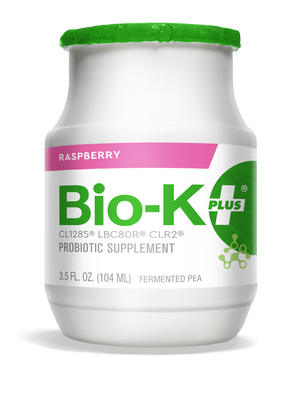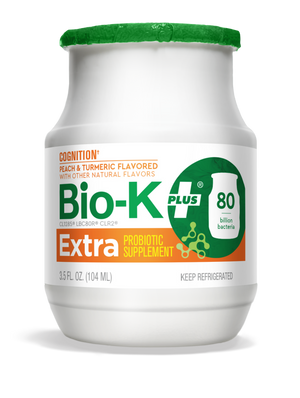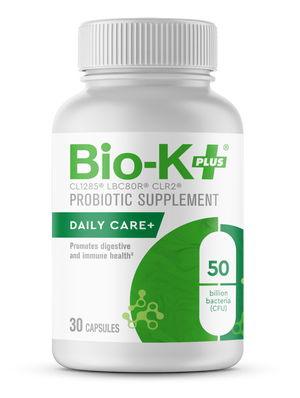What is Stress? Understanding Types of Stress
Bio-K-Plus Company
What is Stress? Understanding the Different Types of Stress
Your chest is tight, your heart rate is increasing. Maybe you even feel a little queasy as your mind races without reprieve. Stress is no stranger to any of us. Whether it’s a result of first date jitters or a third-round job interview, stress is a part of life.
This biological manifestation of our inner turmoil can occur both acutely or chronically. Luckily, you don’t need to suffer. We’ll break down the basics of stress, including the different kinds and how it affects your body, and then teach you how to treat and prevent stress. Whether you have high workplace stress or feel like your mental health is beginning to suffer from your prolonged stress, this blog post can help. Keep reading, wellness awaits.
Stress 101
As ubiquitous as it is, what is stress actually? We certainly know how it makes us feel, but we don’t always know why it makes us feel that way. Basically, stress is a biological response, either caused by:
- Intrinsic stimuli – These are stressors arising internally. Examples include fears, feelings of uncertainty, lack of control, and internal beliefs.
- Extrinsic stimuli – These are stressors arising externally. Examples include significant life changes, environmental changes, unpredictable occurrences, unpleasant social and workplace interactions, and traumatic experiences.
The stress response is how your body interacts with these stimuli. Of course, there are different types of stress. Let’s look more closely at the two main forms:
- Acute stress
- Chronic stress
What is Acute Stress?
You might recognize acute stress as your body’s fight-or-flight response. Your body initiates this response as a reaction to stimuli such as:
- A perceived threat
- A perceived challenge
- A perceived scare
The resulting feeling of stress is intense and in some cases even exciting (think of people who love roller coasters or scary movies). Long ago, an unknown rustling in the woods might trigger your ancestor’s stress response as they looked for signs of dangers. Their body was preparing them to either fight or run away from the incoming danger.
Now, we don’t usually have to worry about bear attacks or rival hunters, but seemingly more mundane things can trigger acute stress such as a job interview or public speaking engagement. While isolated incidences of acute stress are not likely to harm healthy people, severe acute stress can cause physical and mental health problems such as:
- Post-traumatic stress disorder
- Tension headaches
- Stomach problems
- Sleep problems
- Heart attack

Of course, most people don’t need to worry about these health consequences as a result of one stressful situation. The threat arises when someone has an underlying health condition that makes them more sensitive to stress or when they repeatedly experience acute stress, especially more severe iterations such as a physical attack rather than a job interview.
What is Chronic Stress?
While acute stress refers to single stressful situation, chronic stress involves long-term stressors. It can sometimes be easier to identify acute stress. Your body’s response to chronic stress is less noticeable; however, its consequences can be worse in both duration and severity.
The effects of chronic stress are much more serious and can cause some of the health problems listed above as well as others. If you suffer from chronic stress, it’s important to identify your stressors and mitigate or prevent their effect. We’ll discuss stress treatment and prevention later.
How Stress Affects the Body
To manage stress and the potentially life-threatening diseases it can trigger, it’s helpful to understand its physiological mechanisms. How stress affects your body depends on the:
- Type
- Timing
- Severity
Stress, especially chronic stress, can increase your likelihood of developing many disorders and can trigger or worsen many diseases. It interacts differently with the various systems and organs that allow your body to function normally. To better understand how stress affects your body, we’ll focus on its effects on the:
- brain
- immune system
- cardiovascular system
- gut
- endocrine system
Stress and the Brain
More and more studies have demonstrated that chronic stress results in structural changes in the brain that not only affect the stress response but also:
- Cognition
- Memory
The intensity and duration of the stressor affect the severity of these changes. Memory and cognitive effects include:
- Reduced spatial memory
- Reduced verbal memory
- Reduced learning ability
In some cases, stress can punctually improve memory functions, such as in unfamiliar, life-threatening situations when your mind needs to be sharp to keep you alive.
In addition to structural changes, stress can also increase the likelihood of developing cognitive, behavioral and mood disorders.
Basically, too much stress is bad for your brain and can raise stress hormone levels.
Stress and the Immune System
For thousands of years, scholars have noticed the association between stress and a weakened immune system. Recent studies have shown that stress hormones can pass through the blood-brain barrier and affect the immune system, even impairing it. As a result, some studies have shown that stress can cause:
- Growth of malignant cells
- Genetic instability
- Tumor expansion
If you find yourself frequently feeling sick, it might be helpful to take inventory of your stressors and focus on both your physical and mental wellness. By learning how to support your immune system and practice relaxation techniques, you’ll be able to support your body and your overall health.
Stress and the Cardiovascular System
Both chronic and acute stress can negatively affect the cardiovascular system. One of the first responses to stress is an increased heart rate and blood pressure. These changes can cause long-term consequences such as:
- High blood pressure.
- Blood clotting disorders
- Vascular changes
- Cardiac arrhythmias
- Myocardial infarction
Reducing your stress is an important step to take if you’re concerned about your heart health.
Stress and the Gut
Anyone who’s ever gotten a stomach ache before the first day of school or a big presentation knows that stress and the gut are related. Stress affects the gastrointestinal (GI) system in several ways:
- Stress can affect appetite.
- Stress can disrupt the normal function of the GI tract.
- Stress can aggravate inflammatory diseases such as Crohn’s disease or irritable bowel syndrome (IBS) because it changes the intestine’s functionality.
- Stress can affect the movement of the GI tract by preventing stomach emptying or increasing the movement of the large intestine (as with IBS)
How to Treat and Prevent Stress
It’s no exaggeration to say that stress can wreak havoc on your body. That’s why not only stress treatment but also stress prevention are essential for your overall wellness. By developing stress management skills, you'll be better equipped to handle your daily stress reaction. To help you begin to relieve your stress, here are nine stress-fighting strategies:
Whichever strategy you choose, it’s important to start taking your wellness seriously and banish stress from your life whenever possible.
Prioritize Your Wellness with Bio-K+®
Life is too short to be anything but your best self. Stress steals your joy and can cause potentially life-threatening physical consequences. Your body is a complex and delicate ecosystem, and stress can throw the whole thing out of balance.
In addition, knowing that there is a strong brain-gut axis and that the gut is considered your second brain, taking care of our gut health is crucial to your overall health. Considering a high quality probiotic could help. Bio-K+® formulated drinkables and probiotic capsules can help you support your gut and build a daily self-care routine.
Sources:
Yaribeygi, H., Panahi, Y., Sahraei, H., Johnston, T. P., & Sahebkar, A. (2017). The impact of stress on body function: A review. EXCLI journal, 16, 1057–1072. https://doi.org/10.17179/excli2017-480
McEwen B.S. (2017). Neurobiological and Systemic Effects of Chronic Stress. Chronic stress (Thousand Oaks, Calif). 1,2470547017692328 https://doi.org/10.1177/2470547017692328
Dragos,D., & Tănăsescu, M. D. (2010). The effect of stress on the defense systems. Journal of medicine and life, 3(1), 10–18. https://pubmed.ncbi.nlm.nih.gov/20302192/
Kivimäki, M., & Steptoe, A. (2018). Effects of stress on the development and progression of cardiovascular disease. Nature reviews. Cardiology, 15(4), 215–229. Effects of stress on the development and progression of cardiovascular disease | Nature Reviews Cardiology
Bhatia, V., & Tandon, R. K. (2005). Stress and the gastrointestinal tract. Journal of gastroenterology and hepatology, 20(3), 332-339.https://onlinelibrary.wiley.com/doi/full/10.1111/j.1440-1746.2004.03508.x
Mayo Foundation for Medical Education and Research. (2021, July 29). Identify your stress triggers. Mayo Clinic. https://www.mayoclinic.org/healthy-lifestyle/stress-management/in-depth/stress-management/art-20044151.
Mayo Foundation for Medical Education and Research. (2021, March 18). 12 tips to tame stress. Mayo Clinic. https://www.mayoclinic.org/healthy-lifestyle/stress-management/in-depth/stress-relievers/art-20047257.




